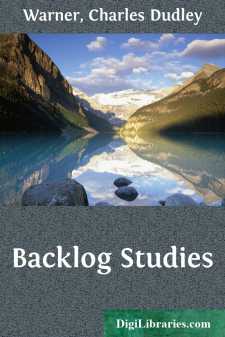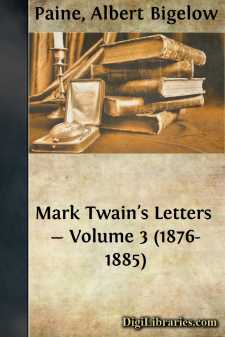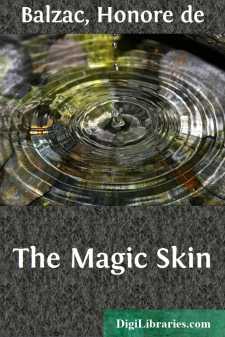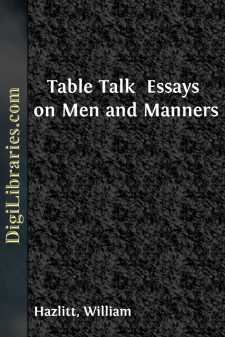Literary Collections
- American 84
- Ancient, Classical & Medieval 14
- Asian 1
- Australian & Oceanian 1
- Canadian 55
- Continental European 121
- English, Irish, Scottish, Welsh 179
- Essays 160
- General 24
- Letters 46
- Middle Eastern 1
Literary Collections Books
Sort by:
FIRST STUDY The fire on the hearth has almost gone out in New England; the hearth has gone out; the family has lost its center; age ceases to be respected; sex is only distinguished by a difference between millinery bills and tailors' bills; there is no more toast-and-cider; the young are not allowed to eat mince-pies at ten o'clock at night; half a cheese is no longer set to toast before the...
more...
by:
George Meredith
CHAPTER I. ACROSS LONDON BRIDGE A gentleman, noteworthy for a lively countenance and a waistcoat to match it, crossing London Bridge at noon on a gusty April day, was almost magically detached from his conflict with the gale by some sly strip of slipperiness, abounding in that conduit of the markets, which had more or less adroitly performed the trick upon preceding passengers, and now laid this one...
more...
by:
Wilkie Collins
CHAPTER I In the first part of ROBINSON CRUSOE, at page one hundred and twenty-nine, you will find it thus written: "Now I saw, though too late, the Folly of beginning a Work before we count the Cost, and before we judge rightly of our own Strength to go through with it." Only yesterday, I opened my ROBINSON CRUSOE at that place. Only this morning (May twenty-first, Eighteen hundred and fifty),...
more...
The Monday Evening Club of Hartford was an association of most ofthe literary talent of that city, and it included a number of verydistinguished members. The writers, the editors, the lawyers, andthe ministers of the gospel who composed it were more often than notmen of national or international distinction. There was but onepaper at each meeting, and it was likely to be a paper that wouldlater find...
more...
by:
Honore de Balzac
I. THE TALISMAN Towards the end of the month of October 1829 a young man entered the Palais-Royal just as the gaming-houses opened, agreeably to the law which protects a passion by its very nature easily excisable. He mounted the staircase of one of the gambling hells distinguished by the number 36, without too much deliberation. "Your hat, sir, if you please?" a thin, querulous voice called...
more...
CHAPTER I STREET MUSIC There was no room for him on the sidewalk, so he took up his position beyond the curbstone. The light from the large arc-lamp overhead, exposed the old man's thin white hair, withered face and threadbare clothes. His sightless eyes were turned toward the passing throng, and his head was slightly bent in an expectant attitude. But the hand that drew the wheezy bow across the...
more...
by:
Arnold Bennett
THE DOME He wakened from a charming dream, in which the hat had played a conspicuous part. 'I shouldn't mind having that hat,' he murmured. A darkness which no eye could penetrate surrounded him as he lay in bed. Absolute obscurity was essential to the repose of that singular brain, and he had perfected arrangements for supplying the deficiencies of Nature's night. He touched a...
more...
by:
Saki
THE TOYS OF PEACE “Harvey,” said Eleanor Bope, handing her brother a cutting from a London morning paper of the 19th of March, “just read this about children’s toys, please; it exactly carries out some of our ideas about influence and upbringing.” “In the view of the National Peace Council,” ran the extract, “there are grave objections to presenting our boys with regiments of fighting...
more...
by:
Honore de Balzac
MADAME FIRMIANI Many tales, either rich in situations or made dramatic by some of the innumerable tricks of chance, carry with them their own particular setting, which can be rendered artistically or simply by those who narrate them, without their subjects losing any, even the least of their charms. But there are some incidents in human experience to which the heart alone is able to give life; there...
more...
by:
William Hazlitt
ESSAY I. ON THE PLEASURE OF PAINTING 'There is a pleasure in painting which none but painters know.' In writing, you have to contend with the world; in painting, you have only to carry on a friendly strife with Nature. You sit down to your task, and are happy. From the moment that you take up the pencil, and look Nature in the face, you are at peace with your own heart. No angry passions rise...
more...











